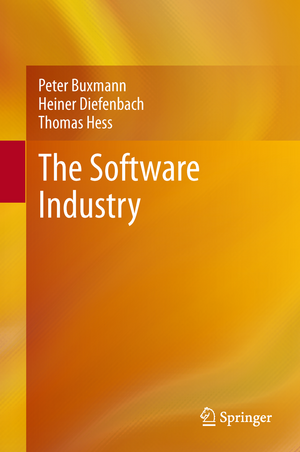The Software Industry: Economic Principles, Strategies, Perspectives
Autor Peter Buxmann, Heiner Diefenbach, Thomas Hessen Limba Engleză Hardback – 12 sep 2012
| Toate formatele și edițiile | Preț | Express |
|---|---|---|
| Paperback (1) | 329.44 lei 6-8 săpt. | |
| Springer Berlin, Heidelberg – 15 oct 2014 | 329.44 lei 6-8 săpt. | |
| Hardback (1) | 504.49 lei 6-8 săpt. | |
| Springer Berlin, Heidelberg – 12 sep 2012 | 504.49 lei 6-8 săpt. |
Preț: 504.49 lei
Preț vechi: 630.62 lei
-20% Nou
Puncte Express: 757
Preț estimativ în valută:
96.55€ • 100.42$ • 79.70£
96.55€ • 100.42$ • 79.70£
Carte tipărită la comandă
Livrare economică 14-28 aprilie
Preluare comenzi: 021 569.72.76
Specificații
ISBN-13: 9783642315091
ISBN-10: 3642315097
Pagini: 250
Ilustrații: XII, 224 p.
Dimensiuni: 155 x 235 x 20 mm
Greutate: 0.45 kg
Ediția:2013
Editura: Springer Berlin, Heidelberg
Colecția Springer
Locul publicării:Berlin, Heidelberg, Germany
ISBN-10: 3642315097
Pagini: 250
Ilustrații: XII, 224 p.
Dimensiuni: 155 x 235 x 20 mm
Greutate: 0.45 kg
Ediția:2013
Editura: Springer Berlin, Heidelberg
Colecția Springer
Locul publicării:Berlin, Heidelberg, Germany
Public țintă
ResearchCuprins
A. Background: How the software industry works.- Economic principles at work in the software industry.- Software vendor strategies.- B. Specific Issues: Outsourcing and offshoring of software development.- Platform concepts.- Software as a Service. 7. Open source software
Recenzii
From the reviews:
“Software has become a commodity that can face competition, be quality tested and certified, and support user-centered services on demand. This book describes these aspects, the challenges the industry has faced, and the way the industry has responded to user demands. … A good reference on the software industry, this book will be appreciated by practitioners, academics, researchers, students, and programmers.” (Harekrishna Misra, Computing Reviews, July, 2013)
“Software has become a commodity that can face competition, be quality tested and certified, and support user-centered services on demand. This book describes these aspects, the challenges the industry has faced, and the way the industry has responded to user demands. … A good reference on the software industry, this book will be appreciated by practitioners, academics, researchers, students, and programmers.” (Harekrishna Misra, Computing Reviews, July, 2013)
Notă biografică
Peter Buxmann is a Professor of Software Business & Information Management at Darmstadt University of Technology. His research fields include Software Business, Future Internet Economy, and Information Management. Moreover, he supports the foundation of IT companies and serves as a Department Editor of the Journal Wirtschaftsinformatik / Business & Information Systems Engineering.
Heiner Diefenbach is CEO of TDS AG, Neckarsulm (Germany), a stock market listed IT services company. He has more than 20 years experience in the IT Industry as a board member at major players such as Atos Origin and Computer Science Corporation.
Thomas Hess
After his studies in Information Systems at Darmstadt University of Technology, Thomas Hess completed his doctorate at St. Gallen University (Switzerland) in 1995. Since 2001 Thomas has been a professor at LMU Munich, where he also serves as director of the Institute for Information Systems and New Media. His research focuses on the digitalization of media industries, on software vendors and on new value systems.
Heiner Diefenbach is CEO of TDS AG, Neckarsulm (Germany), a stock market listed IT services company. He has more than 20 years experience in the IT Industry as a board member at major players such as Atos Origin and Computer Science Corporation.
Thomas Hess
After his studies in Information Systems at Darmstadt University of Technology, Thomas Hess completed his doctorate at St. Gallen University (Switzerland) in 1995. Since 2001 Thomas has been a professor at LMU Munich, where he also serves as director of the Institute for Information Systems and New Media. His research focuses on the digitalization of media industries, on software vendors and on new value systems.
Textul de pe ultima copertă
Whether ERP software, office applications, open-source products or online games: In terms of its economic characteristics, software differs fundamentally from industrial goods or services. Based on the economic principles and rules of the software industry, the book reveals strategies and business models to software vendors that comprise cooperation, distribution, pricing and production and industrialization strategies, as well as software as a service and platform concepts. Further aspects including the outsourcing behavior of software vendors and users; providing business software as open source software; selecting software; and the value chains in the software industry are also addressed. Based on a number of expert meetings, it contains numerous case studies and new empirical findings. Target audience of the book are professionals and executives from the software, consulting and IT branches as well as students and scholars of business administration, computer science, business and industrial engineering.
Caracteristici
How does the software industry work, and why? In which direction is the development headed? Strategies and prospects Economic Principles Includes supplementary material: sn.pub/extras












![Using Hoshin Kanri to Improve the Value Stream [With CDROM]: From Theory to Practice](https://i3.books-express.ro/bt/9781420084238/using-hoshin-kanri-to-improve-the-value-stream-with-cdrom.jpg)











